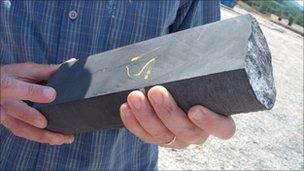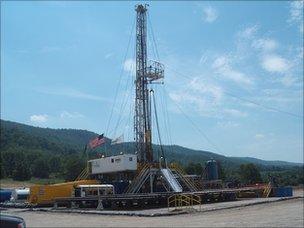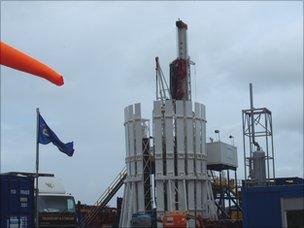Natural gas from shale rock promises energy revolution
- Published

A core of shale rock from which gas is a natural by-product
A new source of energy, shale gas promises to add significantly to the world's energy reserves but there are concerns about the environmental impact of extraction.
BP's former chief executive Tony Hayward has described it as a "game changer" in energy supply, the major oil companies are betting millions on its success and it might just turn Blackpool into the new Dallas.
Shale gas seems to answer the oil industry's desire for an accessible energy source perfectly just as other sources are becoming more problematic.
The Deepwater Horizon disaster demonstrated the dangers of searching for oil and gas in ever more extreme environments.
Alaska, Greenland and the South Atlantic may have tempting oil reserves but when something goes wrong in deep water or in an isolated region it can be fearsomely difficult to fix.
And this is what is spurring the search for land-based sources of hydrocarbons.
Shale gas exists in large quantities and promising sources lie close to many big energy-intensive cities.
In terms of electricity production it is a cleaner power source than coal or oil, and new horizontal drilling techniques are making it easier to reach.
"Natural gas is now abundant and the idea that we're going to run out has miraculously disappeared," says energy market analyst Nick Grealy.
In the United States business is booming with the enormous Marcellus shale gas field, which runs through New York State, Pennsylvania and West Virginia, rapidly ramping up production.
Shale gas may already account for more than 10% of US natural gas production and analysts project that could rise to 50% within 20 years.
Bradford County in Pennsylvania is experiencing what Grealy describes as a "Beverly Hillbillies-style" gas boom with local farmers making thousands of dollars a day leasing out the right to drill on their land.
Contaminated water
But the boom may not come without a cost.
Shale gas extraction involves pumping water, sand and chemicals into rock formations under high pressure in a technique known as hydraulic fracturing.
There have been reports from across the US of contamination of underground water supplies and associated health problems.
Truman Burnett points to a pathway of dead vegetation between Chesapeake Energy's gas well in Granville Township, Bradford County, and the pond on his land.
An accidental release of polluted water spilled out of the site, killed trees and contaminated the water in the pond.

A Chesapeake Energy gas rig in Bradford County, Pennsylvania
"Since then it's killed all the fish. It turns colours different times of the day. Now it's fluorescent orange," he said.
Chesapeake accepted that one of their contractors caused a surface water spillage.
But the gas companies vehemently deny responsibility for the methane that has found its way into some local water supplies.
Granville Summit resident Shana Spencer said methane contamination led to her well water becoming flammable. Put a match to the kitchen tap and a flame would leap up.
Others in this isolated area no longer trust their well water, relying on bottled water since the drillers arrived.
David Spigelmyer, vice-president of government relations at Chesapeake Energy said the firm's gas extraction takes place a mile or more underground.
"Groundwater rests between 300 and 500 feet and we have multiple layers of cement and steel to protect these freshwater aquifers," he said.
But local farmer Dave Bohlander remains concerned.
"No one really knows what's going on a mile down.
"They're essentially blowing up the earth underneath with five million gallons of chemical-laced water.
"They don't really know the effect. All we know is we never had problems with our water and now we do."
The health fears proved sufficiently compelling for neighbouring New York State to announce a moratorium on new drilling and for the government's Environmental Protection Agency to begin an investigation.
Kate Sinding, senior attorney at the US Natural Resources Defense Council said: "We need to evaluate the environmental and health risks before we charge forward."
UK reserves
In Britain, the shale gas revolution may be just beginning.

Cuadrilla Resources are drilling deep into the Bowland shale, just four miles from Blackpool Tower
The geology of Dorset and the Isle of Wight is said to bear comparison with the fruitful Barnett shale of Texas but it is Lancashire that has got the energy companies excited.
Four miles from Blackpool Tower, Cuadrilla Resources has built what looks almost like a replica to drill deep into Bowland shale, geological parent of some of the UK's offshore gas reserves.
It could be three or four years before gas is produced in significant quantities in the UK but the signs are promising.
Mark Miller, the general manager of the operations group at Cuadrilla Resources said the gas was there, it was just a question of whether his men could extract it economically.
"We think they can. We'll know soon though."
By then it may be easier to say if the gas beneath our feet is a blessing or a curse.
Costing the Earth, Blackpool The New Dallas reports on the shale gas revolution on BBC Radio Four on Wednesday 8th September at 9pm and after on BBC iPlayer.
- Published30 July 2010